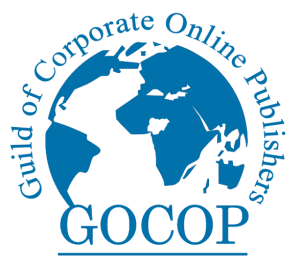Website Management
OpenLife Nigeria reports that in line with its mission to enhance professionalism through consistent training and enlightenment, Guild Of Corporate Online Publishers, GOCOP, during its 7th Annual Conference in Abuja on October 5, offered training to members on how to drive traffic and enhance visibility through the instrumentality of Search Engine Optimization, SEO.
In a 13-slide power point presentation titled ‘Website Optimization: Essential Strategies To Drive Traffic, Using Search Engine Optimization,’ George Kaduna, Digital Strategist & Senior Content Manager at Premium Times, explained, in details, how publishers can explore opportunities in online engagements and optimize gains.
In defining SEO, Kaduna stated that it is “The process by which content creators attempt to get more visibility for their website in search engine results pages on Google, Bing, Yahoo, DuckDuckGo, and other search engines,”
He added that “Search is one of the main ways in which people discover content online. Ranking higher in search engines can lead to an increase in traffic to a website,” he lectured.
Kaduna listed “On-page SEO, Off-page SEO and Technical SEO,” as veritable “Process of organizing a website’s content to improve the likelihood of appearing in search results.”
In the category of “On-page SEO,” Kaduna explained that emphasis should be placed on “contents, keywords, HTML tags, internal links, image optimization, meta data and URL.”
He stated that attention should equally be paid to “back links, guest posting, social promotion, listing and PR” for “Off-page SEO.”
In like manner, Kaduna advised publishers to focus on “page speed, site structure, sitemaps, indexation and structured data” in “Technical SEO.”
He pointed out that blogs could have been listed on Google Search, “But are you seen by your potential readers? ” He asked rhetorically.
He added that the situation is getting haywire given that “More contents are being put at the top of the page.”
As a remedy, George Kaduna offered the following solutions as reproduced below:
On-page Strategy
Content Quality: Creating quality and reliable contents are some of the most important things to do. Google would not showcase false and unreliable contents.
Keywords
Creating keywords that lead people to your website at all times is very important. It helps to optimize the intent of your audience to find you.
Image Optimisation
Always prioritise quality images. Ensure that they are compressed by serving them in webp format. Properly tag images by adding your keyword in alt text.
Internal & External Links
Improve your SERP ranking by adding internal and external links in your stories.
Off-page strategy
Backlinks
Link building also called backlinks are an effective SEO tool because they show search engines that your content is authoritative and relevant, helping you rank higher in SERPs.
The more backlinks from high-authority sites a page has, the more authoritative it may seem to Google. And that can help the page rank higher.
Content Marketing
Content marketing is an important off-page SEO tactic. Publishing great content is an effective way to earn backlinks, gain media attention, and show Expertise, Authoritativeness and Trustworthiness.
And finding ways to distribute that content to other channels can help boost off-page signals. E.g. PR, Content Syndication, Social Media, Podcasts and Guest Posting and Forums.
Reviews
Reviews are a great way to help others trust your business. Reviews are one of the most important factors Google takes into account when evaluating your site’s E-A-T. They are vital to your local SEO success.
Google recommends replying to all reviews. Good and bad. Doing so shows that you value your customers’ business and feedback.
Events
Events can contribute to your off-page SEO strategy. Not only can they engage your audience, but you can benefit from creating a buzz around your business. This can drive social engagement and links. For example, you can earn brand mentions while the event is being promoted. Or if attendees write summary articles afterward.
Technical SEO strategy
Mobile friendly website: Google uses mobile-first indexing. This means that it looks at mobile versions of webpages to index and rank content. So make sure your website is compatible on mobile devices.
Craw only one version of your website
Users and crawlers should only be able to access one of these two versions of your site: https://premiumtimesng.com or https://www.premiumtimesng.com
Improve page speed
Page speed is a ranking factor both on mobile and desktop. Make sure your site loads as fast as possible. You can use Google’s PageSpeed Insights tool to check your website’s current speed.
Find and fix duplicate content
Duplicate content is when you have exact- or near-duplicate content on multiple pages on your site. Google doesn’t penalize sites for having duplicate content.
Find and fix broken pages
Having broken pages on your website negatively affects user experience. And if those pages have backlinks, they go wasted because they point to dead resources.
Optimize for core web vitals
Core Web Vitals are speed metrics that Google uses to measure user experience. You can check your website’s performance for Core Web Vitals metrics in Google Search Console.
Implement Structured Data
Implementing a structured data to your news pages can help Google understand more about the web page and show better title text, images, and date information for the article in search results on Google Search.
Use Hreflang
If your site has content in multiple languages, you need to use hreflang tags. Hreflang is an HTML attribute used for specifying a webpage’s language and geographical targeting.
Further, George Kaduna pointed out that Google displays news through “Google Search, Google News and Google Discover.”
He recommended the following “essential resources,” as a guide for continuous and better SEO understanding:
SEO for Google News Newsletter: https://www.seoforgooglenews.com
SEO for Journalism Slack Channel: https://seoforjournalism.slack.com
Search Engine Land: https://searchengineland.com
UberSuggest: https://chrome.google.com/webstore/detail/ubersuggest-seo-and-keywo/nmpgaoofmjlimabncmnmnopjabbflegf
Semrush: https://www.semrush.com/
Search Engine Journal: https://www.searchenginejournal.com/seo/
Specialised News SEO Dashboards: https://newsdashboard.com, https://www.newzdash.com







